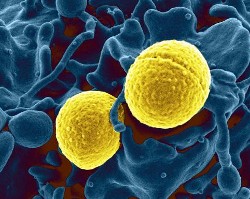A new challenge on InnoCentive asks for ways to quickly diagnose Staphylococcus aureus bacteria colonies in the nose and throat of patients with point-of-care devices. The competition, sponsored by the Cleveland Clinic, has a prize of $20,000 and a deadline for submissions of 27 August 2013.
InnoCentive in Waltham, Massachusetts conducts open-innovation, crowd-sourcing competitions for corporate and organization sponsors. InnoCentive calls this kind of competition a theoretical challenge that requires a written proposal.
Most staph infections occur on the skin and are easily treated with antibiotics. Some staph bacteria strains, such as methicillin-resistant Staphylococcus aureus or MRSA, or resistant to some antibiotics and more difficult to treat. Current methods for detecting staph bacteria and determining if they are resistant to antibiotics require taking culture samples that must be sent off to a lab for analysis, with results usually returned in 24 to 72 hours.
In this challenge, the Cleveland Clinic is seeking techniques to identify specific biomarkers of staph bacteria that colonize in the nasal passages and throat, which are risk factors for infections with patients following surgery. The solution also needs to be able to discriminate between staph bacteria resistant to antibiotics, and more benign strains.
In addition, the proposed techniques need to be capable of operating at the point of care, which the sponsor indicates cannot rely on growing the bacteria in an external culture for testing. Cleveland Clinic specifies as well that the techniques not need sophisticated equipment, and results should be returned in less than an hour.
Proposals submitted for this challenge will be evaluated by Cleveland Clinic. To receive the full award, contestants must grant exclusive intellectual property rights to the sponsor. If a full exclusive grant of intellectual property rights cannot be made, Cleveland Clinic is willing to consider a licensing agreement for a partial award.
Read more:
- GlaxoSmithKline Crowdsourcing Bioelectronic Research Ideas
- Challenge Seeks Discontinued Drugs to Treat Rare Diseases
- Challenge Awarding $60,000 for Health Technology Ideas
- Cloud Services Create Rare Disease Solutions Challenge
- Challenge Seeks Kids’ Central Nervous System Measurements
* * *


 RSS - Posts
RSS - Posts
You must be logged in to post a comment.